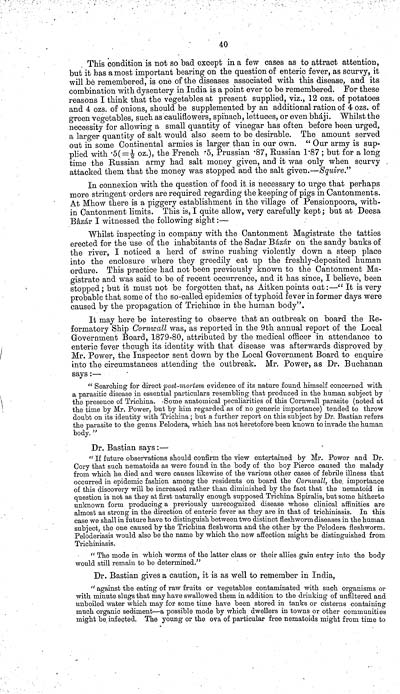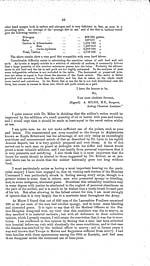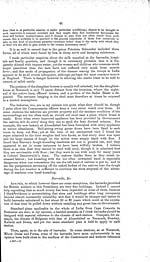Medicine - Disease > Report on enteric fever
(56) Page 40
Download files
Individual page:
Thumbnail gallery: Grid view | List view

40
This condition is not so bad except in a few cases as to attract attention,
but it has a most important bearing on the question of enteric fever, as scurvy, it
will be remembered, is one of the diseases associated with this disease, and its
combination with dysentery in India is a point ever to be remembered. For these
reasons I think that the vegetables at present supplied, viz., 12 ozs. of potatoes
and 4 ozs. of onions, should be supplemented by an additional ration of 4 ozs. of
green vegetables, such as cauliflowers, spinach, lettuces, or even bhji. Whilst the
necessity for allowing a small quantity of vinegar has often before been urged,
a larger quantity of salt would also seem to be desirable. The amount served
out in some Continental armies is larger than in our own. "Our army is sup-
plied with *5( = 1/2 oz.), the French 5, Prussian 87, Russian 187; but for a long
time the Russian army had salt money given, and it was only when scurvy
attacked them that the money was stopped and the salt given.-Squire."
In connexion with the question of food it is necessary to urge that perhaps
more stringent orders are required regarding the keeping of pigs in Cantonments.
At Mhow there is a piggery establishment in the village of Pensionpoora, with-
in Cantonment limits. This is, I quite allow, very carefully kept; but at Deesa
Bzr I witnessed the following sight:-
Whilst inspecting in company with the Cantonment Magistrate the tatties
erected for the use of the inhabitants of the Sadar Bzr on the sandy banks of
the river, I noticed a herd of swine rushing violently down a steep place
into the enclosure where they greedily eat up the freshly-deposited human
ordure. This practice had not been previously known to the Cantonment Ma-
gistrate and was said to be of recent occurrence, and it has since, I believe, been
stopped; but it must not be forgotten that, as Aitken points out:-"It is very
probable that some of the so-called epidemics of typhoid fever in former days were
caused by the propagation of Trichin in the human body".
It may here be interesting to observe that an outbreak on board the Re-
formatory Ship Cornwall was, as reported in the 9th annual report of the Local
Government Board, 1879-80, attributed by the medical officer in attendance to
enteric fever though its identity with that disease was afterwards disproved by
Mr. Power, the Inspector sent down by the Local Government Board to enquire
into the circumstances attending the outbreak. Mr. Power, as Dr. Buchanan
says:-
"Searching for direct post-mortem evidence of its nature found himself concerned with
a parasitic disease in essential particulars resembling that produced in the human subject by
the presence of Trichina. Some anatomical peculiarities of this Cornwall parasite (noted at
the time by Mr. Power, but by him regarded as of no generic importance) tended to throw
doubt on its identity with Trichina; but a further report on this subject by Dr. Bastian refers
the parasite to the genus Pelodera, which has not heretofore been known to invade the human
body."
Dr. Bastian says:-
"If future observations should confirm the view entertained by Mr. Power and Dr.
Cory that such nematoids as were found in the body of the boy Pierce caused the malady
from which he died and were causes likewise of the various other cases of febrile illness that
occurred in epidemic fashion among the residents on board the Cornwall, the importance
of this discovery will be increased rather than diminished by the fact that the nematoid in
question is not as they at first naturally enough supposed Trichina Spiralis, but some hitherto
unknown form producing a previously unrecognized disease whose clinical affinities are
almost as strong in the direction of enteric fever as they are in that of trichiniasis. In this
case we shall in future have to distinguish between two distinct fleshworm diseases in the human
subject, the one caused by the Trichina fleshworm and the other by the Pelodera fleshworm.
Peloderiasis would also be the name by which the new affection might be distinguished from
Trichiniasis.
"The mode in which worms of the latter class or their allies gain entry into the body
would still remain to be determined."
Dr. Bastian gives a caution, it is as well to remember in India,
"against the eating of raw fruits or vegetables contaminated with such organisms or
with minute slugs that may have swallowed them in addition to the drinking of unfiltered and
unboiled water which may for some time have been stored in tanks or cisterns containing
much organic sediment-a possible mode by which dwellers in towns or other communities
might be infected. The young or the ova of particular free nematoids might from time to
This condition is not so bad except in a few cases as to attract attention,
but it has a most important bearing on the question of enteric fever, as scurvy, it
will be remembered, is one of the diseases associated with this disease, and its
combination with dysentery in India is a point ever to be remembered. For these
reasons I think that the vegetables at present supplied, viz., 12 ozs. of potatoes
and 4 ozs. of onions, should be supplemented by an additional ration of 4 ozs. of
green vegetables, such as cauliflowers, spinach, lettuces, or even bhji. Whilst the
necessity for allowing a small quantity of vinegar has often before been urged,
a larger quantity of salt would also seem to be desirable. The amount served
out in some Continental armies is larger than in our own. "Our army is sup-
plied with *5( = 1/2 oz.), the French 5, Prussian 87, Russian 187; but for a long
time the Russian army had salt money given, and it was only when scurvy
attacked them that the money was stopped and the salt given.-Squire."
In connexion with the question of food it is necessary to urge that perhaps
more stringent orders are required regarding the keeping of pigs in Cantonments.
At Mhow there is a piggery establishment in the village of Pensionpoora, with-
in Cantonment limits. This is, I quite allow, very carefully kept; but at Deesa
Bzr I witnessed the following sight:-
Whilst inspecting in company with the Cantonment Magistrate the tatties
erected for the use of the inhabitants of the Sadar Bzr on the sandy banks of
the river, I noticed a herd of swine rushing violently down a steep place
into the enclosure where they greedily eat up the freshly-deposited human
ordure. This practice had not been previously known to the Cantonment Ma-
gistrate and was said to be of recent occurrence, and it has since, I believe, been
stopped; but it must not be forgotten that, as Aitken points out:-"It is very
probable that some of the so-called epidemics of typhoid fever in former days were
caused by the propagation of Trichin in the human body".
It may here be interesting to observe that an outbreak on board the Re-
formatory Ship Cornwall was, as reported in the 9th annual report of the Local
Government Board, 1879-80, attributed by the medical officer in attendance to
enteric fever though its identity with that disease was afterwards disproved by
Mr. Power, the Inspector sent down by the Local Government Board to enquire
into the circumstances attending the outbreak. Mr. Power, as Dr. Buchanan
says:-
"Searching for direct post-mortem evidence of its nature found himself concerned with
a parasitic disease in essential particulars resembling that produced in the human subject by
the presence of Trichina. Some anatomical peculiarities of this Cornwall parasite (noted at
the time by Mr. Power, but by him regarded as of no generic importance) tended to throw
doubt on its identity with Trichina; but a further report on this subject by Dr. Bastian refers
the parasite to the genus Pelodera, which has not heretofore been known to invade the human
body."
Dr. Bastian says:-
"If future observations should confirm the view entertained by Mr. Power and Dr.
Cory that such nematoids as were found in the body of the boy Pierce caused the malady
from which he died and were causes likewise of the various other cases of febrile illness that
occurred in epidemic fashion among the residents on board the Cornwall, the importance
of this discovery will be increased rather than diminished by the fact that the nematoid in
question is not as they at first naturally enough supposed Trichina Spiralis, but some hitherto
unknown form producing a previously unrecognized disease whose clinical affinities are
almost as strong in the direction of enteric fever as they are in that of trichiniasis. In this
case we shall in future have to distinguish between two distinct fleshworm diseases in the human
subject, the one caused by the Trichina fleshworm and the other by the Pelodera fleshworm.
Peloderiasis would also be the name by which the new affection might be distinguished from
Trichiniasis.
"The mode in which worms of the latter class or their allies gain entry into the body
would still remain to be determined."
Dr. Bastian gives a caution, it is as well to remember in India,
"against the eating of raw fruits or vegetables contaminated with such organisms or
with minute slugs that may have swallowed them in addition to the drinking of unfiltered and
unboiled water which may for some time have been stored in tanks or cisterns containing
much organic sediment-a possible mode by which dwellers in towns or other communities
might be infected. The young or the ova of particular free nematoids might from time to
Set display mode to: Large image | Zoom image | Transcription
Images and transcriptions on this page, including medium image downloads, may be used under the Creative Commons Attribution 4.0 International Licence unless otherwise stated. ![]()
| India Papers > Medicine - Disease > Report on enteric fever > (56) Page 40 |
|---|
| Permanent URL | https://digital.nls.uk/74577686 |
|---|
| Description | Dated 1883, report of typhoid fever at stations occupied by British troops in Bombay Presidency. |
|---|---|
| Shelfmark | IP/13/SB.6 |
| Additional NLS resources: | |




